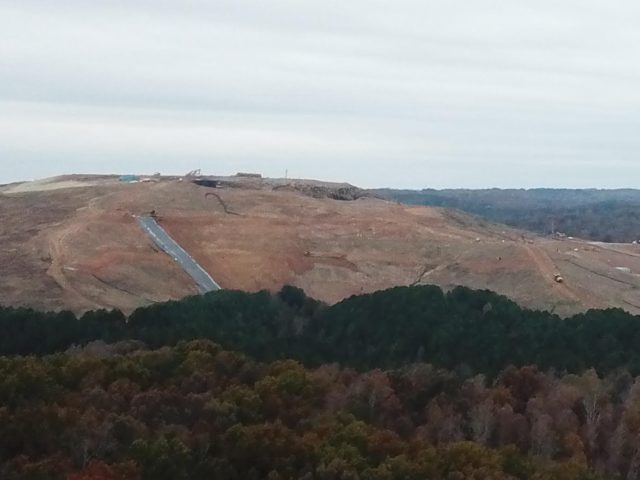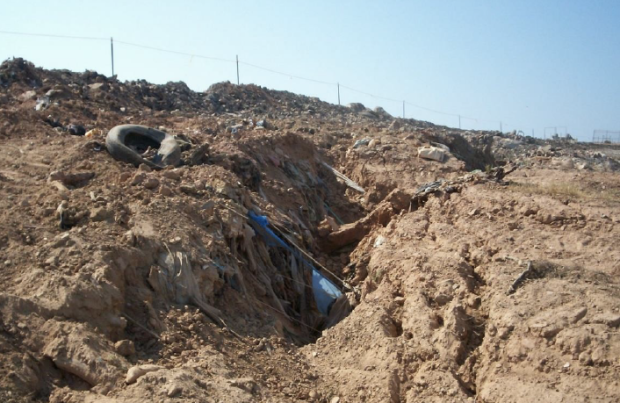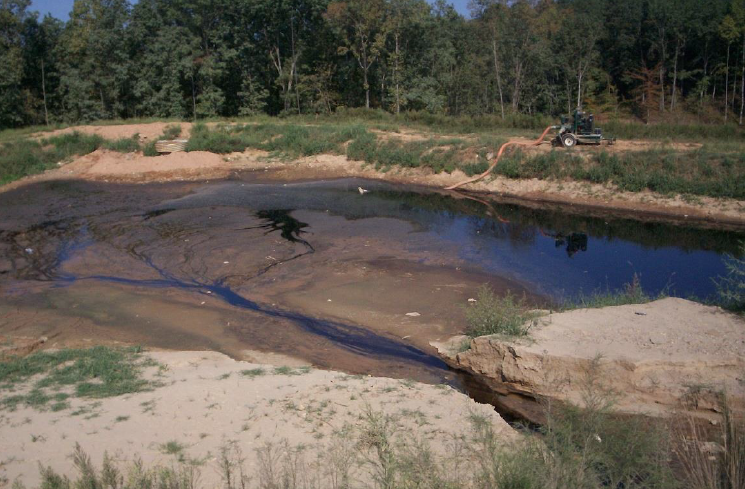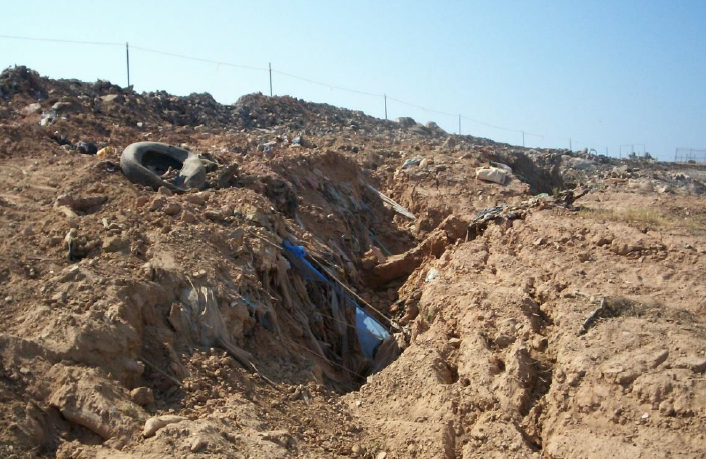By Max Blau
Carolyn Dorondo couldn’t escape the smell of garbage. There were days last year when she couldn’t go outside due to the smell.
Some nights, the stench wafted into her Ball Ground home, awakening her from a restful sleep. The odor grew so foul that Dorondo, along with other residents of Cherokee County, filed complaints with environmental regulators.
“The stench in our air was ruining our daily lives,” Dorondo said.

Less than a mile from Dorondo’s home, the operators of the Pine Bluff Landfill were facing a crisis in the middle of the 914-acre dump that was largely hidden from neighbors’ view.
What was once a small crack in the middle of the landfill had widened into a 1,000-foot-long ravine last September. Odors from exposed waste spread for miles, into posh subdivisions and over family farms. Uncontrolled leachate — liquid formed when water mixes with decomposing waste — flowed out of the landfill site into a nearby creek. The damage from the crack broke the company’s equipment that was designed to monitor how much toxic gas was in the air.
Hundreds of pages of records obtained by Georgia Health News reveal the extent of the violations at the Pine Bluff landfill for the first time.
An expert on the industry, who requested anonymity, reviewed the documents obtained by GHN about the violations, and called the series of collapses at the site “the worst thing I’ve ever read short of an entire landfill being shut down.”
One state official, Kenneth Phillips of the Georgia Environmental Protection Division (EPD), told Dorondo that the collapses left waste exposed to the air and released odorous gases.
Coal ash waste?
Over the past two years, Ball Ground, a small town on the outskirts of Atlanta’s northern suburbs, has experienced two of Georgia’s largest landfill emergencies in recent history.
This summer, the EPD ordered Waste Management of Metro Atlanta, Inc., the Pine Bluff landfill’s owner and a subsidiary of one of America’s largest waste companies, to pay a $217,000 settlement. The year before, the state agency settled with the Eagle Point Landfill, located a short drive from the Pine Bluff landfill, for nearly $210,000. They are two of the largest settlements reached for landfill emergencies by the state’s environmental agency in the past two decades.

Waste companies have come under fire in recent years for improper practices in the waste disposal process. Numerous studies show that people living near landfills are likely to be exposed to worse air quality — and a higher risk of respiratory diseases — than people who live elsewhere.
Marla Prince, a spokeswoman for Waste Management, told GHN that the company “worked transparently to safely implement measures to stabilize the slope [of the landfill], monitor the movement, and remove liquids.” Prince said the company has taken steps to reduce the impact of the emergency and “sees no evidence” of any significant environmental damage from the collapse.
One year after the most recent Ball Ground landfill collapse, residents say Waste Management has shared few details about the full extent of the damage. The landfill is one of the few Georgia dumps that accept coal ash, a toxic byproduct of the burning of coal. Prince did not answer questions regarding residents’ concerns about the potential impact on human health, nor did she address whether the collapse disrupted toxic coal ash on the site. Gordon Johnson, an engineer and president of Burgess Environmental, who reviewed the records about the landfill emergency, “suspected that coal ash did not cause the waste failure, but was likely contained in the wastes that failed.”
“It’s deeply concerning,” said Jesse Demonbreun-Chapman, executive director of the Coosa River Basin Initiative. “It’s a nasty business. Any unregulated release of toxins going into the environment can be incredibly damaging.”
Rapid growth in Cherokee
Cherokee County faced a waste disposal dilemma in the early 1990s. The metro Atlanta county’s population had grown by roughly 75 percent during the 1980s, and its landfill had little space left. Compounding the problem, the landfill was seriously outdated, with no liner to prevent leachate from seeping into the ground and possibly spreading contamination.

Local officials decided against expanding the old landfill. Instead, they inked a deal with Recycle & Recover, Inc., which had a roughly 750-acre site for use as a modern landfill, with a liner to prevent toxins from leaking into the ground below.
“The landfill was here before we got here,” said Steve Brooks, a resident of Ball Ground for the past two decades. “It wasn’t a problem most of the time. But there were a few days it would be stinking bad.”
Over the years, the Pine Bluff landfill quickly expanded, changing ownership multiple times until it was eventually purchased by a subsidiary of Waste Management. The Houston-based company collects trash in almost every state and owns about 300 landfills.
“The use of commercial landfill facilities for disposal of coal ash introduces a new aspect of risk,” Johnson said. “Acceptance of waste represents their main income, and construction of the landfill footprint represents their main cost. As a result, there is a significant profit incentive to jam as much waste into that footprint as is possible. The resulting stacking of wastes increases the potential for the types of waste failures that occurred at the Pine Bluff landfill.”
For much of its existence, the Pine Bluff landfill accepted solid waste such as household trash. But Pine Bluff landfill became one of only seven landfills to accept the toxic waste following the passage of the nation’s first comprehensive regulations on coal ash. Since 2017, the Pine Bluff landfill has received at least 50,000 tons of coal ash, mostly from Georgia Power, which has transported waste there from Plant Kraft and a nearby landfill, both located in Chatham County.
Company filings obtained by GHN suggest the root cause of the Pine Bluff Landfill”s collapse dates back eight years. The landfill has accepted roughly 1 million tons of waste annually. Some of that was considered “high moisture content waste” that, in combination with heavy rains, allowed high levels of liquids to accumulate inside the landfill. When the landfill operators tried to place more waste on top of the dump, they triggered what’s known in the industry as a “slope instability” event, which damaged equipment that pumped liquid out of the landfill. By late August 2019, the cracks grew into a ravine that was roughly 1,000 feet long.
“It’s like a movie where the earth opens up and kills someone, but for real,” one landfill expert told GHN.
Two weeks after Waste Management notified state regulators of the problem, six EPD staffers toured the landfill site to assess the damage, and they smelled odors from exposed waste, including one odor that they suspected was hydrogen sulfide. The federal Occupational Safety and Health Administration (OSHA) notes that low exposure to hydrogen sulfide can lead to minor health issues such as headaches, nausea and breathing problems. People who experience prolonged high exposure to the toxin may develop pulmonary edema, caused by excess fluid in the lungs, and can even die.
As the EPD investigators walked around, they took photos of leachate flowing freely into ponds, ditches and a creek. The company’s engineers had constructed a berm to minimize future collapses, but regulators noted that these efforts had done little to make the ground more stable.
This past November, the state agency notified Waste Management of 10 violations that had been documented at the site, involving failure to design a stable landfill, failure to operate a leachate collection system, and failure to control disease vectors on-site.
The regulators ordered the company to comply with solid waste permit laws, conduct an investigation into the landfill failure, and improve its plans to protect local water quality. Waste Management was facing a potential fine of nearly $435,000, but the state settled for a lesser amount because of the company’s “prompt corrections and cooperation,” EPD spokesman Kevin Chambers said.
When the problem was at its worst, neighbors found the smell from the landfill hard to bear. “If the air [was] still and calm, it was enough to make you violently ill when you walked out the door,” Brooks said. “I swore if I’d lit a match outside, it would have blown up.”
Another emergency
For residents like Brooks, the Pine Bluff collapse was a reminder of another emergency that happened nine miles to the northeast, on the other side of Ball Ground. In May 2018, Advanced Disposal experienced similar cracking at the Eagle Point landfill, which was also caused by large volumes of high-moisture waste.
Shortly after the emergency event occurred, Advanced Disposal briefly closed the landfill to commercial traffic. The following month, contaminated stormwater flowed into wetlands near the Etowah River. The landfill has since reopened.
The EPD cited the Eagle Point landfill for violations of Georgia’s solid waste, water quality and air quality regulations. In January 2019, state regulators reached a settlement with the company, including a fine of nearly $210,000. A spokesman for Advanced Disposal declined comment about the violations.
Later that year, another company expressed interest in buying the Eagle Point landfill. It was the same company that owns the landfill on the other side of Ball Ground — Waste Management.
‘Really alarming’
By January 2020, over four months after the emergency at the Pine Bluff Landfill, Waste Management told EPD regulators that the landfill issues had finally gotten under control.
Prince, of Waste Management, downplayed long-term harm caused by the emergency, saying that the company has seen no evidence of “significant environmental harm.”
“Further nearby creeks and surface water has been sampled and there is no evidence of leachate contamination,” Prince told GHN. “[Waste Management of Metro Atlanta] maintains a rigorous odor control program which includes daily monitoring of odors around the landfill perimeter and works with neighboring residents and businesses to promptly address odor concerns.”

She declined to answer specific questions about the potential risks to the health of the landfill’s neighbors, as well as whether toxic coal ash at the site was affected by the most recent collapse. An attorney for Waste Management declined to further clarify the situation when asked for more detailed information about the location of coal ash.
“To the extent that they exist, the documents are proprietary records of [Waste Management of Metro Atlanta] prepared on its own behalf for its own purposes,” Douglas Cloud, an attorney for the company, wrote in an email to GHN.
A root-cause analysis by a Waste Management consultant, which was submitted to the EPD and obtained by Georgia Health News through an open records request, indicated that the company still did not know, as of July, whether the emergency event had damaged the landfill’s protective liner system, which prevents waste liquids from seeping into local groundwater. The company said it would notify the EPD in the coming months.
“There’s a desire to believe these landfills are engineered where there aren’t going to be surprises,” Demonbreun-Chapman said. “It’s all really alarming.”
Neighbors of the Pine Bluff Landfill, some of whom live less than a half-mile away from the dump, have continued to express concerns on social media. Several have complained to the EPD and Waste Management since the most recent collapse.
One year after that last collapse, the rancid odor of rotten eggs is no longer present in the air outside Dorondo’s home, she said. But she doesn’t know how long the situation will last — or whether there will be another collapse.
“We pray that it stays this way,” she said.
Max Blau is a freelancer working for Georgia Health News. He can be reached at maxcblau@gmail.com

